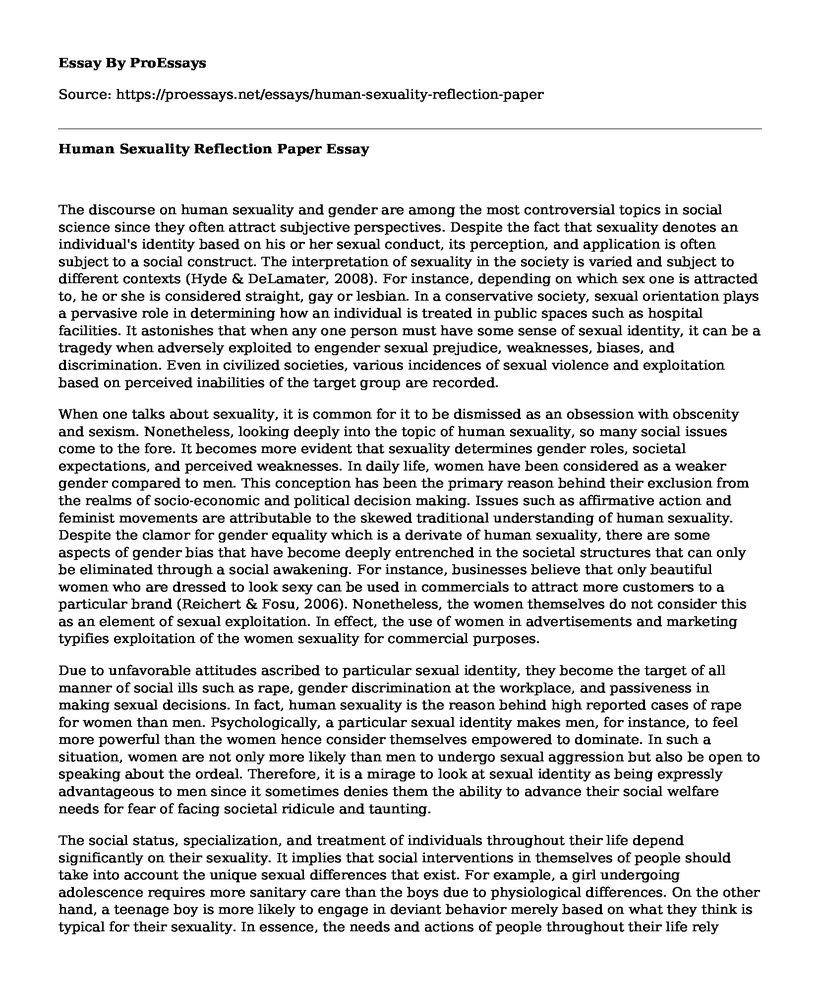The discourse on human sexuality and gender are among the most controversial topics in social science since they often attract subjective perspectives. Despite the fact that sexuality denotes an individual's identity based on his or her sexual conduct, its perception, and application is often subject to a social construct. The interpretation of sexuality in the society is varied and subject to different contexts (Hyde & DeLamater, 2008). For instance, depending on which sex one is attracted to, he or she is considered straight, gay or lesbian. In a conservative society, sexual orientation plays a pervasive role in determining how an individual is treated in public spaces such as hospital facilities. It astonishes that when any one person must have some sense of sexual identity, it can be a tragedy when adversely exploited to engender sexual prejudice, weaknesses, biases, and discrimination. Even in civilized societies, various incidences of sexual violence and exploitation based on perceived inabilities of the target group are recorded.
When one talks about sexuality, it is common for it to be dismissed as an obsession with obscenity and sexism. Nonetheless, looking deeply into the topic of human sexuality, so many social issues come to the fore. It becomes more evident that sexuality determines gender roles, societal expectations, and perceived weaknesses. In daily life, women have been considered as a weaker gender compared to men. This conception has been the primary reason behind their exclusion from the realms of socio-economic and political decision making. Issues such as affirmative action and feminist movements are attributable to the skewed traditional understanding of human sexuality. Despite the clamor for gender equality which is a derivate of human sexuality, there are some aspects of gender bias that have become deeply entrenched in the societal structures that can only be eliminated through a social awakening. For instance, businesses believe that only beautiful women who are dressed to look sexy can be used in commercials to attract more customers to a particular brand (Reichert & Fosu, 2006). Nonetheless, the women themselves do not consider this as an element of sexual exploitation. In effect, the use of women in advertisements and marketing typifies exploitation of the women sexuality for commercial purposes.
Due to unfavorable attitudes ascribed to particular sexual identity, they become the target of all manner of social ills such as rape, gender discrimination at the workplace, and passiveness in making sexual decisions. In fact, human sexuality is the reason behind high reported cases of rape for women than men. Psychologically, a particular sexual identity makes men, for instance, to feel more powerful than the women hence consider themselves empowered to dominate. In such a situation, women are not only more likely than men to undergo sexual aggression but also be open to speaking about the ordeal. Therefore, it is a mirage to look at sexual identity as being expressly advantageous to men since it sometimes denies them the ability to advance their social welfare needs for fear of facing societal ridicule and taunting.
The social status, specialization, and treatment of individuals throughout their life depend significantly on their sexuality. It implies that social interventions in themselves of people should take into account the unique sexual differences that exist. For example, a girl undergoing adolescence requires more sanitary care than the boys due to physiological differences. On the other hand, a teenage boy is more likely to engage in deviant behavior merely based on what they think is typical for their sexuality. In essence, the needs and actions of people throughout their life rely mainly on their sexuality which should inform best interventions.
References
Hyde, J. S., & DeLamater, J. D. (2008). Understanding human sexuality. McGraw-Hill Higher Education.
Reichert, T., & Fosu, I. (2006). Women's responses to sex in advertising: Examining the effect of women's sexual self-schema on responses to sexual content in commercials. Journal of Promotion Management, 11(2-3), 143-153.
Cite this page
Human Sexuality Reflection Paper. (2022, May 15). Retrieved from https://proessays.net/essays/human-sexuality-reflection-paper
If you are the original author of this essay and no longer wish to have it published on the ProEssays website, please click below to request its removal:
- My Advocacy Program: LGBT Teens and Suicide Risk
- Construction of Gender Inequality Through the Media and Homophobia Essay
- Research Paper on Sexual Attraction: Physical Appearance, Scent, & Desire
- Essay Sample on Abortion: The Debate on Reproductive Health and Rights
- Essay Sample on Teenage Pregnancy: A Journey of Pain, Anger and Resentment
- Research Paper on Discrimination Based on Sexual Orientation: What It Is and Why It's Wrong
- Males' Perception of Masculinity & Pornography - Research Paper







